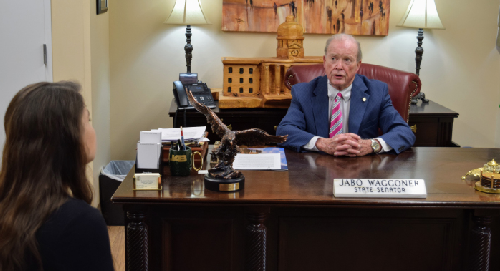State of the State: ‘Rebuilding Alabama’
February 13, 2020
Governor Kay Ivey addressed members of the Alabama House and Senate on Feb. 4 at the annual State of the State address in the Rotunda Room in the Alabama State Capitol Building. Media personnel were allowed to enter around 5:30 p.m. and the general public at 6 p.m.
At 6:30 p.m., a gavel banged on the grand podium to garner the crowd’s attention for the announcement of Ivey’s entrance into the red, white and blue-adorned room.
Following her introduction, Ivey delivered the State of the State address. Points Ivey made were rebuilding Alabama, prison reform, an Alabama lottery and Amendment 1 among others. She also addressed the partisanship in the House and Senate, a matter that will directly affect the Alabama economy and education.
Ivey said that it was no surprise that people on different sides of the aisle do not always see eye-to-eye. Ivey also said that early on into her term as governor she decided that she would hold regular meetings with the bipartisan leadership of both the House and the Senate.
“Unlike we’ve seen nationally, I knew that no one party has a monopoly on good ideas,” Ivey said. “And I felt — and time has proven me correct — that these bipartisan meetings would help us come up with bipartisan solutions on everything from infrastructure funding to hopefully improving our state’s education system.”
“Rebuilding Alabama” was a common theme of the night, from fixing roads and bridges to education and prison reform. Ivey reiterated a previous announcement that the state’s portion of $122 million toward reconstruction of roads and bridges. This money will help more than 48 of Alabama’s 67 counties.
“We had put Band-Aids and duct tape on old ideas, old roads and bridges and tired old prisons long enough,” Ivey said.
Ivey went on to discuss the hot topic of the state of Alabama prisons. She said that one of her top priorities for this upcoming session is tackling another problem that others have either chosen to ignore or been unable to solve.
“Both my strong faith in the Lord — the heartfelt conserve the basic human rights — gives me a sense of urgency to address our long-standing challenges within our criminal justice system,” Ivey said. “Ladies and gentlemen, we simply cannot afford to wait any longer to tackle this problem and failure is not an option.”
Because of the support from the Alabama Legislature, Ivey said that there was progress made with prisons and under-staffing. Ivey has been able to visit two correctional facilities – Holman Correctional Facility in Atmore, Ala. and Tutwiler Prison for Women in Wetumpka, Ala. At these prisons Ivey was able to see first-hand the state of these prisons. There, she knew something had to be done. Ivey then talked about how there is a community college system that provides inmates with re-entry into civilian life. Education was also discussed through Amendment One, which deals with the education board in Alabama.
“Amendment One is about the children and making sure they are learning what they need to in schools,” said Terri Collins, an Alabama House Representative from the 8th District. “Also, it will change how the Board of Education is chosen. In the past, the board was elected into office but with Amendment One the board will be selected by the Governor and then approved by the Senate. This way we have people on the board who are certified in helping children learn and making sure that they will be doing so in an effective way.”
Ivey then addressed that in Alabama we are 49th in the nation in reading and 52nd in math, she then said that the statistics only get worse the further they get into school. She then said that Alabama is one of only six states in the country that elect their school board.
“Very simply, Amendment One will create term limits for the State Board and no member will serve more than two six-year terms, thus bringing fresh new ideas to the commission every few years. Equally important, the newly constituted student board will reflect the racial, gender and geographic diversity to reflect the makeup of students in our public school system.”
Finally, Ivey addressed the Alabama Lottery, including a brief history of the lottery in Alabama. Going all the way back to 1999 Gov. Siegelman promoted a lottery. The last time that the Alabama Legislature gave citizens an opportunity to cast a vote, they voted against the possibility of a lottery by 54 to 46 percent.
“We’ve heard promises of hundreds of millions of dollars, now we’re up to a billion dollars, that would be available if the Legislature would give the people another opportunity to vote on a lottery or if I would negotiate a compact – if it were only that simple,” Ivey said.
Ivey then went on to say that she will be signing an executive order to create a small team of some of Alabama’s most distinguished citizens to gather facts on how much revenue a lottery would generate for the state.
The State of the State highlighted the many issues facing Alabama. This Legislative session will have 105 calendar days to attempt to get bills passed to combat these – and other – issues, but only 30 of those days will have the full chamber and committee meetings.
“At the end of the day we will probably pass about 20 percent of all the bills that will be introduced,” State Senator Jabo Waggoner said.
Although the governor pressed hard for these items to pass, the plethora of issues in Alabama will inevitably leave some problems unsolved. Much debate and negotiation between the two parties is expected.












